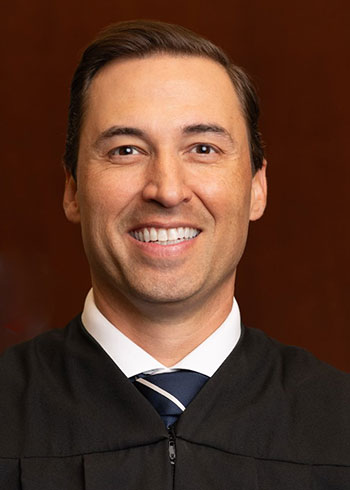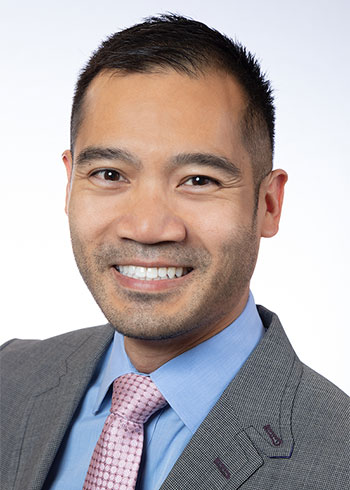
April 3, 2024 – Judge Scott Schlegel and Law Professor David Kemp, pioneers in the use of artificial intelligence (AI) in the law, are scheduled to give the opening plenary at the 2024 State Bar of Wisconsin’s Annual Meeting and Conference in Green Bay.
Schlegel, who sits on the Fifth Circuit Court of Appeal for the State of Louisiana, serves as the chair of the Louisiana Supreme Court Technology Commission. He was recently appointed to the Advisory Council of the American Bar Association Task Force on the Law and Artificial Intelligence
Kemp is an adjunct professor at Rutgers Law School. He teaches courses on lawyering and professional ethics.
Access to Justice
Schlegel turned to AI to help improve the courthouse experience for jurors and litigants and broaden access to justice.
 Jeff M. Brown, Willamette Univ. School of Law 1997, is a legal writer for the State Bar of Wisconsin, Madison. He can be reached by email or by phone at (608) 250-6126.
Jeff M. Brown, Willamette Univ. School of Law 1997, is a legal writer for the State Bar of Wisconsin, Madison. He can be reached by email or by phone at (608) 250-6126.
His court previously spent $30,000 explaining the jury process to potential jurors. Not anymore.
“Using ChatGPT and video software, within 20 minutes I can generate a beautiful two- to three-minute video on any topic I want and put it on my website so that the public can see how to walk through a court hearing,” Schlegel said. “Or, I can send it in those emails about the process that people should expect when they come to court.”
“We’re not practicing law in these videos,” Schlegel said. “We’re simply explaining what to expect so that when people get here, they know what to do and they’re prepared.”
Schlegel also envisions using AI to summarize handbooks on court procedures written for laypeople.
“We can use ChatGPT to regenerate the handbooks in a better way and create videos and make courts more accessible, for little money,” Schlegel said. “My ChatGPT license and my video software maybe cost me $750 total, per year.”
‘Scheduling is Everything’

AI, said Judge Scott Schlegel, “gives me data points in a very quick and easy way to help me with better scheduling. In a trial court, scheduling is everything.” Schlegel sits on the Fifth Circuit Court of Appeal for the State of Louisiana.
Schlegel said that AI can also transcribe and translate court documents, as well as digest vast amounts of scheduling data to spot trends.
“Why shouldn’t AI look at my calendar and see what times are actually being selected?” Schlegel said. “I can push a button and have AI tell me, based on one year’s data, ‘You should be doing 30 appearances at 9 a.m., 27 at 9:30 a.m.,’ whatever the answers are.”
“AI can start building these calendars for me so I’m not manually doing this every year,” Schlegel said. “It can start looking at trends, for example, what messaging works better. For instance, we’re trying to cut down on failures to appear and maybe AI says, ‘Stop threatening defendants that they’re going to get arrested, maybe if you said this, it would be a better approach.’”
AI, said Schlegel, “gives me data points in a very quick and easy way to help me with better scheduling. In a trial court, scheduling is everything.”
Schlegel spent ten years as a trial judge before being elected to the appellate court in 2023.
As a trial court judge, Schlegel pioneered the use of technology to correct inefficiencies in state court systems – something he bumped up against daily when he was a prosecutor.
For instance, for civil cases, Schlegel sets pre-trial conferences for 9 a.m. and motions for 10 a.m.
“The lawyers arguing motions hate billing their clients to sit through pre-trial conferences that they have nothing to do with, so why are we making them wait?” Schlegel said.
Schlegel put all his calendars on a website he built using Squarespace. The electronic scheduling increased judicial efficiencies, Schlegel said.
“It reduced the failure-to-appears for the lawyers because they got the text and email reminders,” Schlegel said. “It also cut down on the calls to my court.”
Techie Professor
Professor David Kemp’s first job after graduating from U.C. Berkeley School of Law was at Justia, a website that provides free copies of legal documents. It was a great fit for Kemp, a self-proclaimed techie.
“I really liked that it combined the social purpose with the law and the tech stuff,” Kemp said. “It was a great intersection of all those things.”
While working at Justia, Kemp realized that he was in a unique position – he could talk tech with the IT department and talk law with the company’s lawyers, who often struggled with technology.
“That’s always been my perspective – making technical things more accessible to people around me and helping others do the same thing,” Kemp said.
Using ChatGPT’s Flaws

Professor David Kemp calls himself a “cautious optimist” when it comes to AI in the legal industry. The way to avoid the dark future predicted by AI doomsayers, Kemp said, is to embrace the technology.
Kemp does that now as an adjunct professor at Rutgers Law School, where he uses ChatGPT to pose research problems for his students.
The idea came to Kemp when he thought back to his experience on law review. He remembered looking up footnotes in law review articles and running down the cases to make sure the page cited in each footnote actually contained the proposition or information for which the author had cited it.
“I really liked that process,” Kemp said. “It was such a big part of learning to think like a lawyer and question everything and to verify everything … I thought that ChatGPT could simulate that experience.”
Kemp was an early adopter of ChatGPT but wasn’t blind to its flaws, which include “hallucinating” fictitious case names and citations. Kemp decided to treat that bug as a feature – and a teaching tool.
Kemp prompts ChatGPT to write a legal document larded with citations, then has his students check the citations. It’s a way not only to teach legal research and reasoning, but to instill in the students a regard for the current limitations of AI.
“We have to teach the consumers of that information to be skeptical and say, ‘I have to make sure that every sentence, no matter how great it sounds, is actually supported by something,’” Kemp said.
‘A Cautious Optimist’
Kemp calls himself a “cautious optimist” when it comes to AI in the legal industry. The way to avoid the dark future predicted by AI doomsayers, Kemp said, is to embrace the technology.
“Part of keeping that from happening is getting more people to learn about it and figure out what is it doing, what can it do, rather than just sticking our heads in the sand, because it’s coming,” Kemp said.
“How do we want to direct its future?” Kemp said. “We can do that right now but if we wait much longer, our voice is going to be drowned out.”
Kemp predicts that the growth of AI will allow humans to focus on using softer skills to perform tasks that AI can’t.
“If we can delegate the things that the machine does easily, then that saves humans the time to do the things that only we can do, like develop relationships or explain things that are intangible – things that sometimes we don’t have time for because we’re so consumed with doing all the writing or the research,” Kemp said.
Learning to use AI, Kemp said, is the key to making sure it doesn’t use us.
“AI is going to be part of our daily lives and our professional lives,” Kemp said. “How do we prepare for that? How do we analyze whether a tool that some salesperson is pushing on us is useful for us? How do we ensure that we’re using it ethically?”
Connect, Learn, and Relax: Annual Meeting & Conference is June 19-21, in Green Bay
Join hundreds of legal professionals and judges from around Wisconsin and the nation this June for the State Bar of Wisconsin's Annual Meeting and Conference.
This year’s AMC returns to Titletown: Join your colleagues at the Hyatt Regency & KI Center in Green Bay. See nationally renowned plenary speakers, attend your choice of more than 20 CLE sessions to enhance your practice, and network and celebrate with your colleagues at Lambeau Field.
Reserve Your Spot by May 10 for Best Rate
Save on your registration when you register by the early early-bird deadline of May 10, 2024. Plus, first time member-attendees save an additional $100 off registration.
To register:
